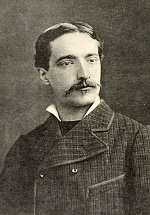Christian de Villeneuve-Esclapon
| Christian de Villeneuve-Esclapon | |
|---|---|
 | |
| Born |
August 8, 1852 Aix-en-Provence, Bouches-du-Rhône, Provence-Alpes-Côte d'Azur, France |
| Died |
April 3, 1931 Paris, France |
| Nationality | French |
| Occupation |
Politician Publisher |
| Spouse(s) | Jeanne Bonaparte |
| Children |
Jules Pierre Napoléon de Villeneuve-Esclapon Henriette Marie Jeanne de Villeneuve-Esclapon Romée Napoléon de Villeneuve-Esclapon Lucien Louis Napoléon de Villeneuve-Esclapon Marie Roselyne de Villeneuve-Esclapon Rolande Anne Mathilde de Villeneuve-Esclapon |
| Parent(s) |
Jules de Villeneuve-Esclapon Henriette de Fresse de Monval |
| Relatives | Pierre Napoléon Bonaparte (father-in-law) |
Christian de Villeneuve-Esclapon (1852–1931) was a French aristocrat, politician and Félibrige supporter. He served in the National Assembly of France from 1889 to 1893 and published a newspaper, Lou Prouvençau.
Biography
Early life
Henri Marie Christian de Villeneuve-Esclapon was born on August 8, 1852, in Aix-en-Provence.[1][2][3][4] His father was Jules de Villeneuve-Esclapon (1809–1895) and his mother, Henriette de Fresse de Monval.[2][4] Upon the death of his father, he became the 10th Marquis de Villeneuve-Esclapon.[3]
Career
He served in the Third Carlist War of 1872–1876 under Carlos, Duke of Madrid (1848–1909).
He embarked upon a career in politics by working as the private secretary of Achille de Vallavieille, the Prefect of Hérault. He then served as a member of the National Assembly of France for Corsica from October 6, 1889, to October 14, 1893.[1]
He was a supporter of Félibrige, and started a newspaper in Aix-en-Provence, Lou Prouvençau.[5][6][7] He also served as editor-in-charge of Occitania and wrote articles in Souleiado.[5] Additionally, he wrote about Théodore Aubanel (1829–1886), Romée de Villeneuve (1170–1250) and the Château de Vaugrenier in Villeneuve-Loubet.
Personal life
He married Princess Jeanne Bonaparte (1861–1910), daughter of Prince Pierre Napoléon Bonaparte (1815–1881) and Justine Eleanore Ruflin, and a great-niece of Napoleon (1769–1821).[2][3] They had six children:
- Jules Pierre Napoléon de Villeneuve-Esclapon (1886–1957).[2] He married Cécile Ernestine Marie de Courtois (1896–1981).[2]
- Henriette Marie Jeanne de Villeneuve-Esclapon (1887–1942).[2] She married Lucien Leret d'Aubigny (1876–1945).[2]
- Romée Napoléon de Villeneuve-Esclapon (1889–1944).[2]
- Lucien Louis Napoléon de Villeneuve-Esclapon (1890–1939).[2] He married Iskouhi-Gladys Matossian (1894–1951).[2]
- Marie Roselyne de Villeneuve-Esclapon (1893–1973).[2] She married Bruno de Maigret (1888–1966).[2]
- Rolande Anne Mathilde de Villeneuve-Esclapon (1896–1972).[2] She married Antoine de Lyée de Belleau (1898–1978).[2]
He died on April 3, 1931, in Paris.[1]
Bibliography
- Lei Jue flourau de Fourcauquié, 13 de setèmbre 1875 (14 pages, Ricateau, Hamelin et Cie, 1875).[8]
- La Félibrejade de la Sainte-Étoile à Avignon (15 pages, Vve Remondet-Aubin, 1876).[9]
- La Première représentation du Pain du péché ("lou Pan dou pecat"), drame provençal en 5 actes et en vers, de Théodore Aubanel (22 pages, Vve Remondet-Aubin, 1878).[10]
- La Maison des Baux (8 pages, L. Duc, 1895).[11]
- Romée de Villeneuve, étude historique (25 pages, Neuilley, 1899).[12]
- La Fondation du château de Villeneuve-Loubet (52 pages, Neuilley, 1902).[13]
References
- 1 2 3 National Assembly of France
- 1 2 3 4 5 6 7 8 9 10 11 12 13 14 GeneaNet
- 1 2 3 The Peerage
- 1 2 Annuaire de la noblesse de France et des maisons souveraines de l'Europe, 1858, Volume 15, p. 325
- 1 2 Georges Bonifassi, La presse régionale de Provence en langue d'Oc: des origines à 1914, Presses Paris Sorbonne, 2003, p. 123
- ↑ Armand Praviel and J-R. de Brousse, L'Anthologie du Félibrige, Paris: Nouvelle Librairie Nationale, 1909, p. 24
- ↑ Carmen Alén Garabato, L'éveil des nationalités et les revendications linguistiques en Europe: (1830–1930), Editions L'Harmattan, 2006, p. 237
- ↑ Google Books
- ↑ Google Books
- ↑ Google Books
- ↑ Google Books
- ↑ Google Books
- ↑ Google Books